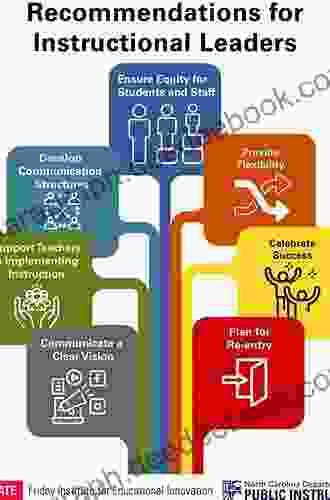Leading for Instructional Improvement: Empowering Educators to Drive Student Success

Effective leadership plays a pivotal role in driving instructional improvement and fostering a culture of excellence within educational institutions. Educational leaders, serving as catalysts for change, hold the responsibility of equipping educators with the tools and resources necessary to maximize student learning outcomes. This comprehensive article explores the multifaceted nature of leading for instructional improvement, showcasing effective practices, strategies, and frameworks that empower educators to become transformative agents within the classroom.
The Importance of Instructional Leadership
Instructional leadership encompasses the collective efforts of school administrators, principals, and teachers working collaboratively to enhance teaching and learning practices. By setting clear expectations, providing ongoing support, and fostering a collaborative environment, instructional leaders create a fertile ground for educators to thrive and students to flourish.
4.7 out of 5
| Language | : | English |
| File size | : | 4961 KB |
| Text-to-Speech | : | Enabled |
| Screen Reader | : | Supported |
| Enhanced typesetting | : | Enabled |
| Word Wise | : | Enabled |
| Print length | : | 343 pages |
| Lending | : | Enabled |
Research consistently demonstrates the positive impact of instructional leadership on student achievement. Studies have shown that schools with strong instructional leadership experience higher levels of student engagement, improved attendance rates, and enhanced academic performance.
Effective Practices for Instructional Leaders
Empowering educators and driving instructional improvement requires a multifaceted approach that encompasses a range of effective practices.
1. Establish a Clear Vision and Goals
Instructional leaders must articulate a well-defined vision for instructional improvement that aligns with the school's overall mission and values. This vision should be communicated effectively to all stakeholders, including educators, students, parents, and the community. Clear goals should be established, providing educators with specific targets to work towards.
2. Foster a Collaborative Culture
Effective instructional leadership fosters a collaborative culture where educators feel valued, respected, and empowered. Leaders encourage teamwork, open communication, and the sharing of best practices. By building a strong sense of community, instructional leaders create a supportive environment where educators can learn from each other and work together to improve teaching and learning.
3. Provide Ongoing Professional Development
Continuous professional development is essential for educators to stay abreast of the latest research-based instructional strategies and best practices. Instructional leaders should provide opportunities for educators to engage in ongoing professional development, both within and outside the school environment.
4. Monitor and Evaluate Instruction
Regular monitoring and evaluation of instruction is crucial for identifying areas of strength and weakness. Instructional leaders should use a variety of data sources, including classroom observations, student work samples, and standardized test scores, to assess the effectiveness of teaching practices. Feedback should be provided to educators in a timely and constructive manner, helping them to refine their instructional approaches.
5. Support Educator Autonomy
While providing necessary guidance and support, instructional leaders should also grant educators autonomy in their classrooms. By empowering educators to make decisions about curriculum, instruction, and assessment, leaders foster a sense of ownership and accountability. This autonomy allows educators to tailor their teaching to the specific needs of their students.
Instructional Improvement Frameworks
There are various instructional improvement frameworks that can provide a structured approach to enhancing teaching and learning practices. Two widely-used frameworks are:
1. Danielson Framework for Teaching
The Danielson Framework for Teaching is a comprehensive evaluation tool that assesses teacher effectiveness across four domains: planning and preparation, classroom environment, instruction, and professional responsibilities. It provides educators with specific criteria to guide their teaching practices and identify areas for improvement.
2. Marzano Framework for Effective Instruction
The Marzano Framework for Effective Instruction outlines nine key principles of effective teaching: providing clear learning goals, creating a supportive learning environment, using effective teaching strategies, providing ongoing assessment, and fostering a positive learning culture. This framework helps educators to focus on the essential elements of effective instruction.
Empowering Educators Through Instructional Leadership
Leading for instructional improvement is not merely about implementing top-down initiatives or micromanaging educators. It is about creating a supportive and empowering environment where educators feel valued and empowered to make a difference in the lives of their students. By embracing effective practices and leveraging instructional improvement frameworks, educational leaders can foster a culture of excellence and continuous growth, driving student success and transformative educational experiences.
Leading for instructional improvement is a complex and multifaceted endeavor that requires a commitment to empowering educators and fostering a culture of collaboration and continuous improvement. By embracing effective practices, utilizing instructional improvement frameworks, and empowering educators with autonomy, instructional leaders can create the conditions necessary for educators to thrive and students to achieve their full potential. The journey towards instructional improvement is an ongoing one, but it is a journey that is well worth taking, as it leads to the transformative power of education for all.
4.7 out of 5
| Language | : | English |
| File size | : | 4961 KB |
| Text-to-Speech | : | Enabled |
| Screen Reader | : | Supported |
| Enhanced typesetting | : | Enabled |
| Word Wise | : | Enabled |
| Print length | : | 343 pages |
| Lending | : | Enabled |
Do you want to contribute by writing guest posts on this blog?
Please contact us and send us a resume of previous articles that you have written.
 Book
Book Page
Page Chapter
Chapter Genre
Genre Reader
Reader Paperback
Paperback E-book
E-book Paragraph
Paragraph Sentence
Sentence Bookmark
Bookmark Shelf
Shelf Glossary
Glossary Bibliography
Bibliography Foreword
Foreword Footnote
Footnote Manuscript
Manuscript Scroll
Scroll Tome
Tome Narrative
Narrative Biography
Biography Thesaurus
Thesaurus Narrator
Narrator Character
Character Librarian
Librarian Catalog
Catalog Borrowing
Borrowing Stacks
Stacks Periodicals
Periodicals Reserve
Reserve Academic
Academic Rare Books
Rare Books Special Collections
Special Collections Interlibrary
Interlibrary Literacy
Literacy Study Group
Study Group Thesis
Thesis Dissertation
Dissertation Book Club
Book Club Theory
Theory Textbooks
Textbooks Caroline O Neill Kuchinsky
Caroline O Neill Kuchinsky Rhonda Bowen
Rhonda Bowen Will Adams
Will Adams Michael P Spradlin
Michael P Spradlin Apostolos Syropoulos
Apostolos Syropoulos Will Eisner
Will Eisner Don Nardo
Don Nardo Elizabeth Miller
Elizabeth Miller Tyler Wagner
Tyler Wagner Cynthia Adams
Cynthia Adams Seamus Bruner
Seamus Bruner Gill Hasson
Gill Hasson R P Singh
R P Singh J D Lenzen
J D Lenzen Thijs Pepping
Thijs Pepping J V Kade
J V Kade William J Mccluskey
William J Mccluskey Jarett Kobek
Jarett Kobek Romulus Hillsborough
Romulus Hillsborough Penelope Silvers
Penelope Silvers
Light bulbAdvertise smarter! Our strategic ad space ensures maximum exposure. Reserve your spot today!

 William ShakespeareHow to Understand and Deal with Abuse Issues: A Comprehensive Guide for...
William ShakespeareHow to Understand and Deal with Abuse Issues: A Comprehensive Guide for...
 Dylan MitchellThe Enduring Love Story of Héloïse and Abélard: A Tale of Passion, Scandal,...
Dylan MitchellThe Enduring Love Story of Héloïse and Abélard: A Tale of Passion, Scandal,... José MartíFollow ·11.6k
José MartíFollow ·11.6k Galen PowellFollow ·3.8k
Galen PowellFollow ·3.8k Theo CoxFollow ·9k
Theo CoxFollow ·9k Amir SimmonsFollow ·17.5k
Amir SimmonsFollow ·17.5k Chase SimmonsFollow ·15.9k
Chase SimmonsFollow ·15.9k Dave SimmonsFollow ·15.7k
Dave SimmonsFollow ·15.7k Houston PowellFollow ·4.1k
Houston PowellFollow ·4.1k Devin RossFollow ·2.9k
Devin RossFollow ·2.9k

 Ricky Bell
Ricky BellThe Marriage: An Absolutely Jaw-Dropping Psychological...
In the realm of...

 Ray Blair
Ray BlairDiscover the Enchanting Charm of Budapest and Its...
Nestled in the heart of...

 Tyrone Powell
Tyrone PowellHuddle: How Women Unlock Their Collective Power
Huddle is a global movement that empowers...

 Grayson Bell
Grayson BellThe Coin Story of the Holocaust: A Symbol of Hope and...
In the depths of the...

 Virginia Woolf
Virginia WoolfFolklore Performance and Identity in Cuzco, Peru: A...
Nestled amidst...

 Dylan Mitchell
Dylan MitchellThe Enduring Love Story of Héloïse and Abélard: A Tale of...
An Intellectual Passion In the heart of...
4.7 out of 5
| Language | : | English |
| File size | : | 4961 KB |
| Text-to-Speech | : | Enabled |
| Screen Reader | : | Supported |
| Enhanced typesetting | : | Enabled |
| Word Wise | : | Enabled |
| Print length | : | 343 pages |
| Lending | : | Enabled |








